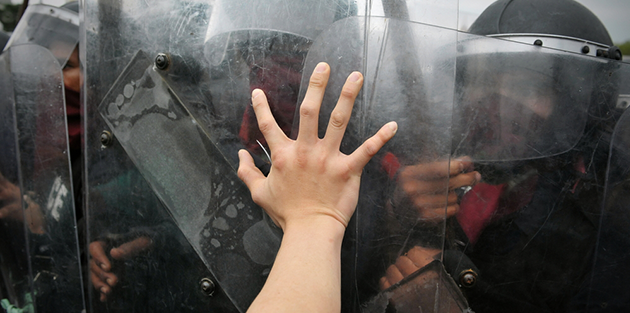Black and Blue: How the State Brings Order
We need rule of law, not law and order by Sandy Ikeda:
Today, the difference between law and order and rule of law is literally a matter of life and death. Rarely has that difference been illustrated so starkly as on the streets and inside the courtrooms of St. Louis County, Missouri, and Staten Island, New York. The tragedy is that too few can articulate it; the terror is that too many can’t even see it. At least, not yet.
Rule of law
The rule of law is often contrasted with the rule of man. According to the rule of law, law should lie as far as possible beyond the arbitrary, unpredictable choices of public authorities.
But the rule of law also contains the idea that the law should neither deliberately privilege nor harm any individual or group. Legislation that aims at a certain outcome for a specific person is contrary to the rule of law. An edict that intentionally takes property from persons in group A in order to benefit persons in group B also violates the rule of law. The law should apply equally to everyone regardless of their status. But as F.A. Hayek pointed out, when the state attempts to impose any large-scale plan on its citizens, its commands must necessarily discriminate against some and favor others.
At the same time, those who believe government (that is, a monopoly over force) is necessary for a free society — to provide national defense, for example — but who also believe in the rule of law tend to support aggression under certain circumstances. One is tax collection, so long as it doesn’t target particular individuals or groups, and so long as the persons or groups benefiting from the tax revenue can’t be identified beforehand. The rule of law is supposed to constrain political power.
The rule of law implies stability and predictability. It weighs against expediency and opportunism in legislation, shifting this way and that as circumstances change. And it weighs in favor of governing according to abstract principles that apply universally. Laws that avoid privilege and favoritism (“rent seeking” in modern terminology) tend to do just this.
When government is small and nonintrusive, the rule of law may, in fact, promote a peaceful kind of law and order. But today, when governments around the world are anything but small and nonintrusive, the difference between law and order and rule of law has never been so stark.
Law and order
No one disputes that a certain kind of social order is a good thing. In general, rioting and pillaging are wrong. But when oppression becomes intolerable and peaceful forms of protest have been ineffective, disorderly conduct and even the destruction of property can be positive forces for political and social change. Think of the Boston Tea Party.
I think it’s safe to say that behind that level of oppression is the authority’s fear that it is losing control, a fear sparked by significant acts of individual defiance against authority. That defiance is usually against the authority of police, the blue tip of the spear wielded by the State and aimed at the heart of the most vulnerable citizens.
Ironically, the very chaos governments fear is itself the consequence of too much “law and order,” and their response is then usually to try to impose even more oppressive and unequal “law and order.” Think of the American Revolution. Think of Tiananmen Square. Governments equate order with control. They view society not as what happens when people freely follow their own plans, but as a machine that they must consciously direct, maintain, and occasionally overhaul, lest the cogs freeze up and the wheels stop turning. For them, society cannot order itself, but must be deliberately ordered by law — the law and order of a police state.
In a police state, no one knows how many people the police kill every year. In a police state, the police are not accountable for the harm they do to the same degree that ordinary citizens are. In a police state, the police have extraordinary privileges under the law that the rest of us do not.
The “law and order” of a police state is the result of surveillance, discrimination, and aggression. The law and order that emerges from a minimal government under the rule of law derives from privacy, equality, and peaceful cooperation.

ABOUT SANDY IKEDA
Sandy Ikeda is a professor of economics at Purchase College, SUNY, and the author of The Dynamics of the Mixed Economy: Toward a Theory of Interventionism.


